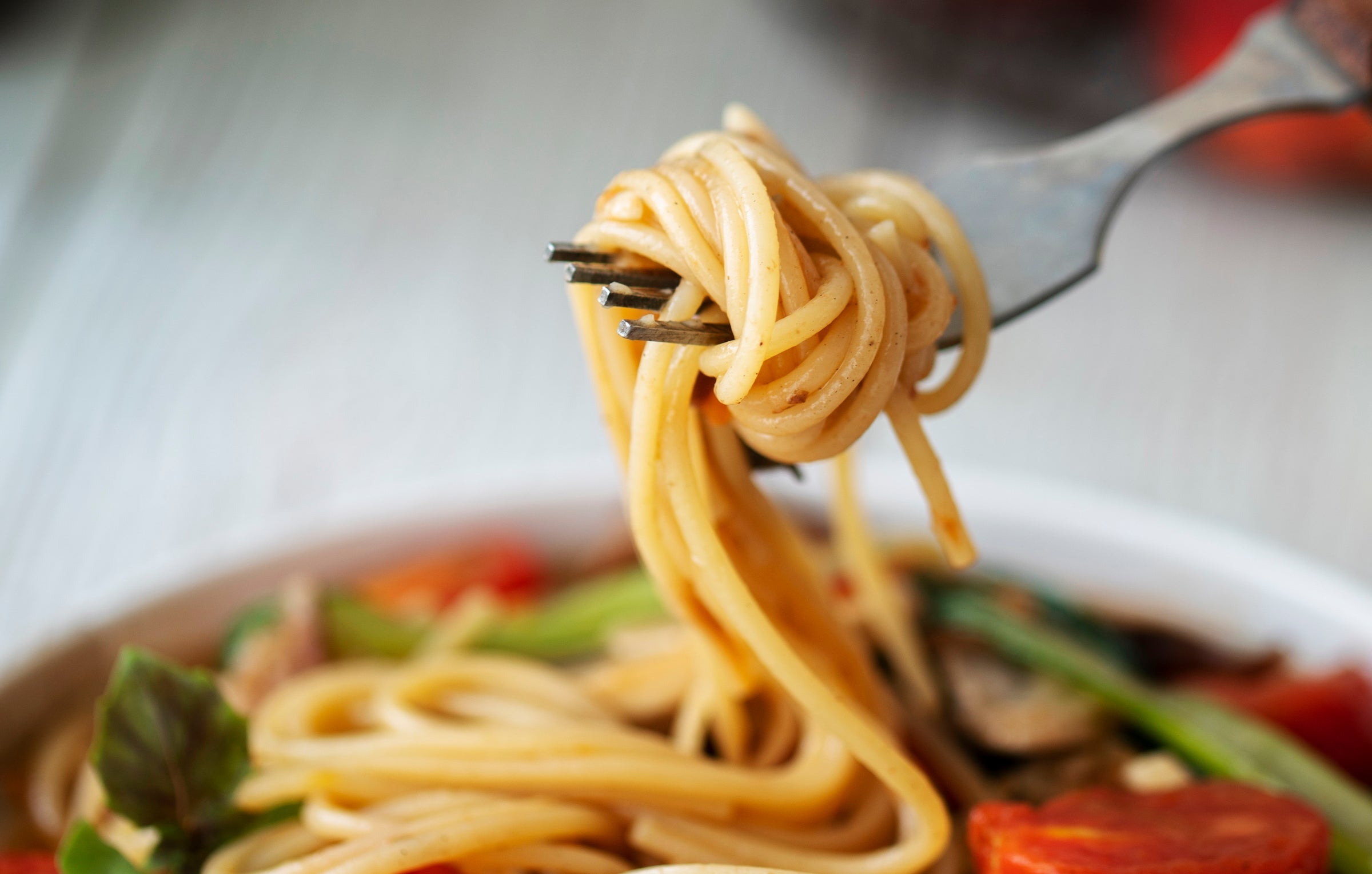What To Eat Before a Marathon: 7 Days Out

Homemade sausage and tomato spaghetti (Photo: Getty Images)
You’ve been training for this marathon for months. Nerves are starting to set in. Things are becoming real. Race day is right around the corner.
As you get closer to race day, you’re probably double-checking to make sure you have all of your gear in check, miles logged, and travel arrangements set. Or maybe you’re still at the beginning phases, trying to get ahead of the curve to feel more in control of the exciting journey you’re about the embark on.
One of the hardest parts about the weeks leading up to the big day is meal prep, especially if you’re traveling for the race. Part of the time you’re home, but those crucial final days you might be staying at a hotel, feeling like you’re at the mercy of the surrounding Uber Eats options. Even if that’s the case, there are certain considerations to make in fueling during your taper.
Tara Martine, a runner and registered dietician knows how important it is to rest and feed your body the right nutrients during the final days before a big race, like a marathon.
“During taper week, the goal is to rest your body and fully recover from all the hard work you’ve put in,” says Martine. “Following a thoughtful nutrition program will give you confidence once your race starts.”
RELATED: This Baked Ziti Recipe Will Help You Recharge Like a Champ
Start planning what foods you need to pack or pick up at a local market to prep the final few days of taper week. To help you plan, Martine offers these tips so you can focus on your pace come race day.
What to Eat Before a Marathon: 1 Week Out
Exactly what you eat will be dependent on your particular dietary needs and/or restrictions, but these guidelines can help you make decisions about how to plan your meals in the final seven days before the marathon.
Focus on replenishing foods.
Replenishing yourself with good nutrition is a critical part of taper week. Base your diet on fruits, vegetables, whole grains, beans, legumes, nuts, and seeds. Avoid processed foods, fast food, junk food, refined sugars, and excess oils. Your emphasis should be on consuming high-carbohydrate foods, with at least 70 percent of the total calories coming from carbohydrates. This will ensure that your glycogen stores are fully replenished for competition.
Trust your body’s process.
You might gain some weight during taper week, but don’t be alarmed. For every gram of stored glycogen, the body stores 3 grams of water, which gives you energy on race day. Stick with your training plan and don’t add on mileage to try and ‘burn off’ those necessary calories.
Keep up with hydration.
Drink plenty of water. In fact, you should start hydrating for the race during taper week. Monitor your urine to make sure that it’s pale to light yellow without a strong odor. This means you’re well-hydrated and ready to run. Remember, if you are traveling by plane, air travel is dehydrating, so don’t be shy about asking your flight attendant for an extra cup of water when they come around.
Make sure some of these plants are on your plate.
Load up on nitrates. Nitrates are found in plants like beets, arugula, and Swiss chard. When consumed, they are converted into the potent vasodilator, nitric oxide, which increases blood flow to the heart and working muscles. It also increases the efficiency by which our muscles produce energy from oxygen. This means you’ll be able to race faster and longer.
What to Eat the Night Before the Race
The last dinner before your race can have a lot of pressure to it, but if you do a little bit of planning, you’ll set yourself up for success.
You want to eat a high-carb, low-fat meal to ensure your body has enough time to fully digest everything. Dine on something you know you can handle so you don’t wake up race morning with an upset stomach. And don’t try anything new.
Consume foods low in fiber to prevent diarrhea, intestinal cramping, and bloating. For example, choose regular spaghetti instead of whole-grain spaghetti.
RELATED: Elyse Kopecky Shows You How to Make Her Pulled Chicken Recipe
Do your best to avoid a late dinner. You don’t want that food sitting in your stomach come race morning. If you get hungry before bedtime, go ahead and snack on some high-carb foods, like bananas or dates.
Foods to avoid: anything spicy, high in fat, deep-fried, or highly acidic, like tomatoes, chocolate, and mint.
What to Eat the Morning of Your Race
If you thought dinner came with a lot of pressure, just wait until breakfast when your race day nerves have likely kicked in.
The biggest rule of thumb for race-day nutrition is: Don’t try anything new. What to eat before the marathon will come down to your usual habits. Eat a breakfast that you have eaten several times in the past before a big run. You don’t want to test your stomach and have an emergency mid-race bathroom stop.
If you normally consume coffee in the morning, then do so on race day. Hot tea or coffee can help clean out your bowels before the start, which can help settle any race-day nerves.
About 2 to 3 hours before the race, drink 1.5 to 2.5 cups of fluids. This will ensure you’re hydrated—especially for races that start later in the morning.
To top off your energy stores, you can consume 15 to 20 grams of carbs within 30 minutes of the start. Fuel on gels, chews, or sports drinks—just make sure it’s the kind you’ve been training with for the past month to avoid any stomach issues.
RELATED: This Golden Milk Overnight Oats Recipe is Easy and Delicious